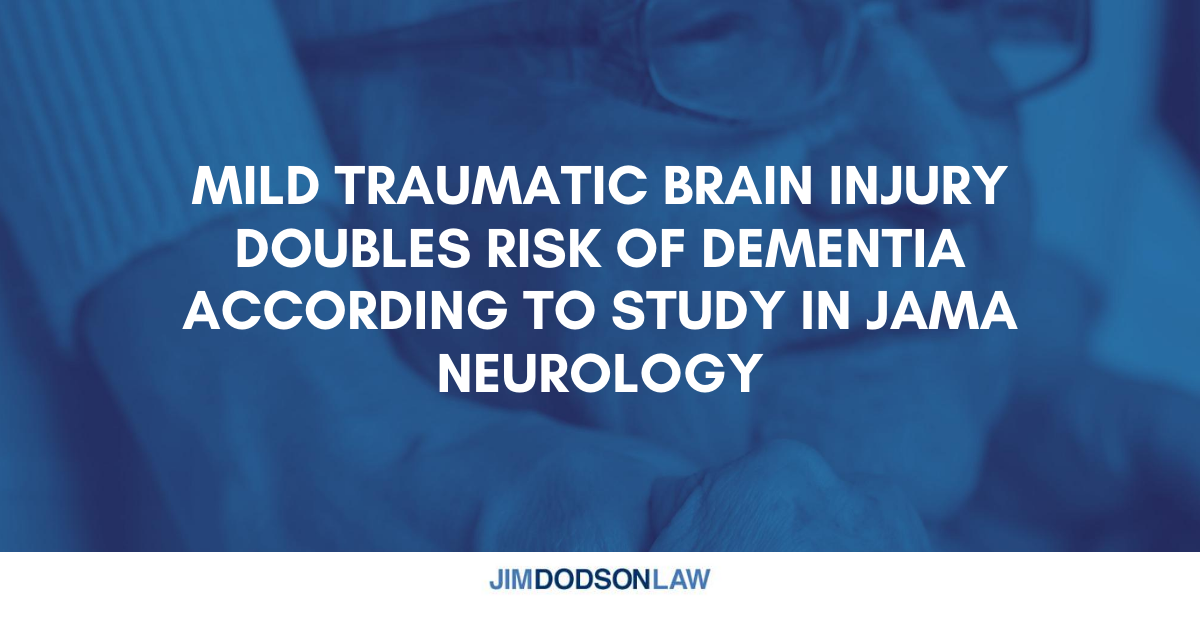
Mild Traumatic Brain Injury Doubles Risk of Dementia According to Study in JAMA Neurology
In 2014, the CDC found there were approximately 2.87 million traumatic brain injury (TBI)-related emergency department visits, hospitalizations, and deaths in the United States. Graded from mild to moderate to severe, TBIs are classified using a clinical scale of alertness or level of consciousness following injury. A concussion is a TBI caused by a bump, blow, or jolt to the head or torso that causes the head and brain to move rapidly back and forth. A concussion can occur with or without a person losing consciousness. Because a person can suffer a concussion without losing consciousness, concussions are graded as mild TBI or mTBI. The majority of people who suffer a concussion do not lose consciousness.
Studies have found moderate to severe TBIs are associated with an increased risk of developing or suffering earlier onset of Alzheimer’s disease and dementia later in life. But few studies have examined the association of mTBI with developing dementia and even fewer specifically examining mTBI without loss of consciousness. Given the alarmingly high rate at which people suffer concussions, researchers sought to determine the association between suffering mTBI without loss of consciousness and the development of dementia, a debilitating and economically devastating disease.
More so than the general population, military personnel are especially vulnerable to suffering TBIs given the nature of their work. Of the military personnel who suffer a mTBI, the majority are caused by shockwaves from a blast injury. Researchers from the University of California, San Francisco conducted a study of military veterans. In total, the study included over 350,000 veterans, comparing those who did and did not suffer a TBI and examining a possible link with developing dementia later in life. After accounting and adjusting for age, medical comorbidities, and psychiatric disorders, researchers found that the rate of dementia was increased in people who suffered TBI across the board, from severe to mild and with or without loss of consciousness.
- Mild TBI without loss of consciousness caused a 2.36-fold increase in dementia
- Mild TBI with loss of consciousness caused a 2.51-fold increase in dementia
- Moderate to severe TBI caused a 3.77-fold increase in dementia
The results are eye opening. Even mild TBI without loss of consciousness was associated with more than a 2-fold increase in the risk of receiving a dementia diagnosis later in life. Dementia is not part of the normal aging process. It is a progressive decline in cognitive function without a cure that wreaks havoc on families emotionally and financially. According to a 2015 study by the National Institutes of Health (NIH), end-of-life costs for dementia far exceeded that of other diseases including heart disease and cancer. The study found that in the last 5 years of life, the average cost of dementia-related care was over $287,000 (by comparison, heart disease was $175,136 and cancer was $173,383.) Costs included insurance, hospitalization, medication, nursing home, hired helpers, and in-home medical care. The study highlighted the financial burden on families facing end-of-life care for a loved one suffering from dementia. According to a recent study published by the American Journal of Public Health, over 60 percent of bankruptcy filers cited medical bills and illness as contributing to financial ruin. The financial consequences of dementia cannot be ignored. It is imperative that a person suffering a mTBI receive appropriate compensation for their care and treatment.
If you hear of anyone in Florida who has suffered an injury or suspects a TBI, please connect with me directly here. If you’re a fellow attorney, please reach out here. I’m happy to help.
References
Barnes DE, Byers AL, Gardner RC, Seal KH, Boscardin WJ, Yaffe K. Association of Mild Traumatic Brain Injury With and Without Loss of Consciousness With Dementia in US Military Veterans. JAMA Neurol. 2018;75(9):1055-1061. doi:10.1001/jamaneurol.2018.0815 https://pubmed.ncbi.nlm.nih.gov/29801145/
Kelley AS, McGarry K, Gorges R, Skinner JS. The burden of health care costs for patients with dementia in the last 5 years of life. Ann Intern Med. 2015;163(10):729-736. doi:10.7326/M15-0381 https://pubmed.ncbi.nlm.nih.gov/26502320/
David U. Himmelstein, Robert M. Lawless, Deborah Thorne, Pamela Foohey, Steffie Woolhandler, “Medical Bankruptcy: Still Common Despite the Affordable Care Act”, American Journal of Public Health 109, no. 3 (March 1, 2019): pp. 431-433. https://doi.org/10.2105/AJPH.2018.304901

